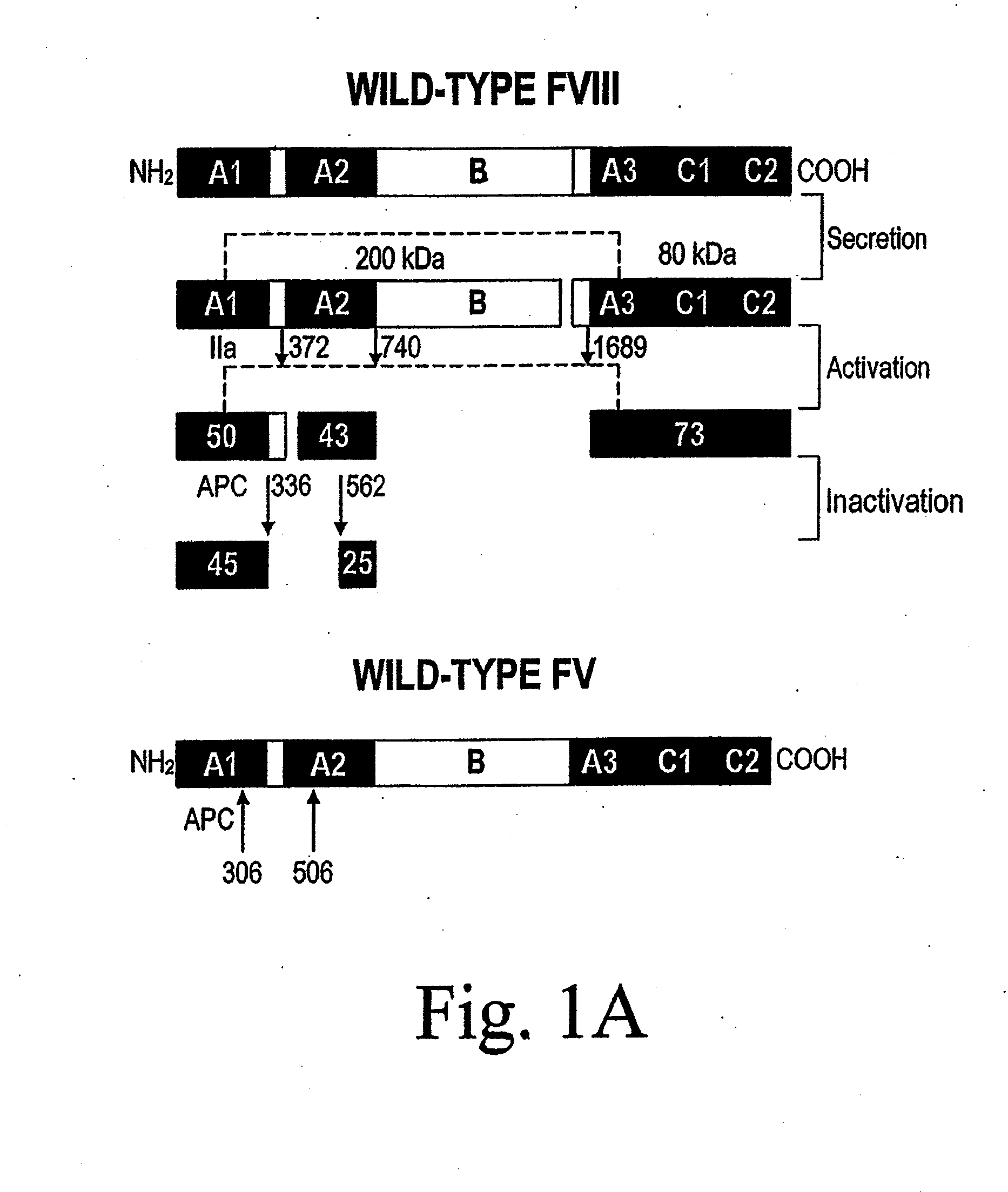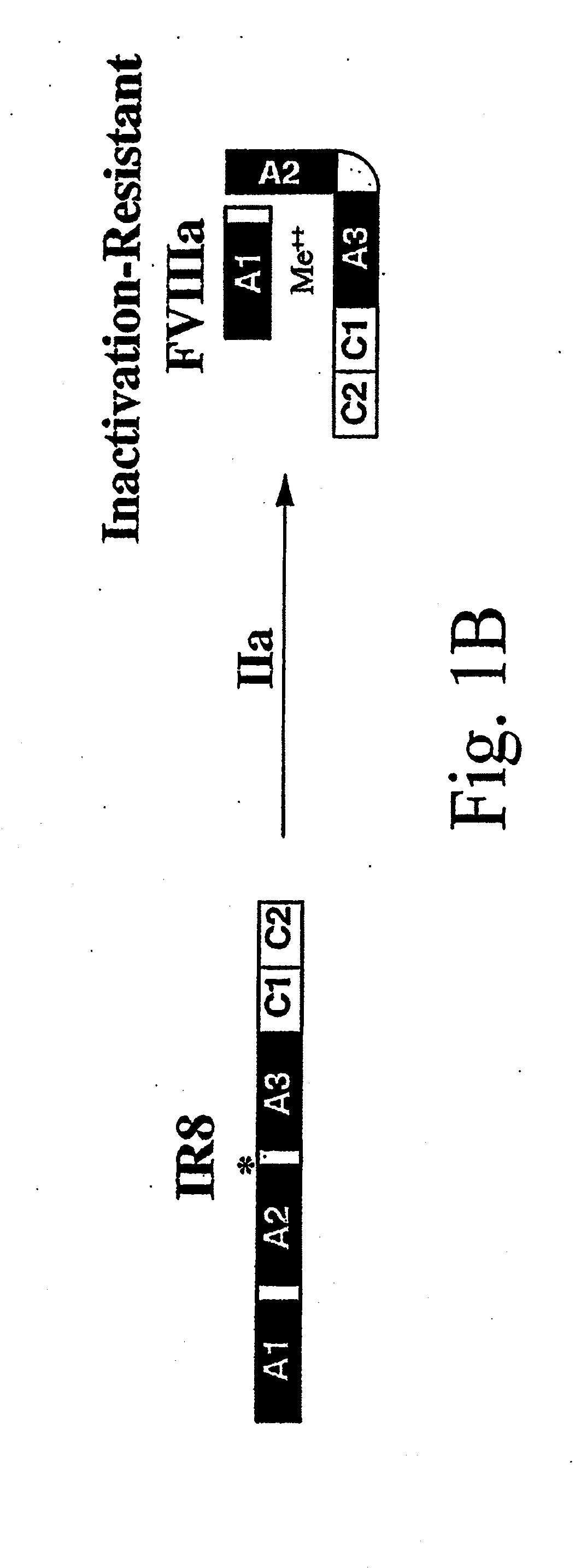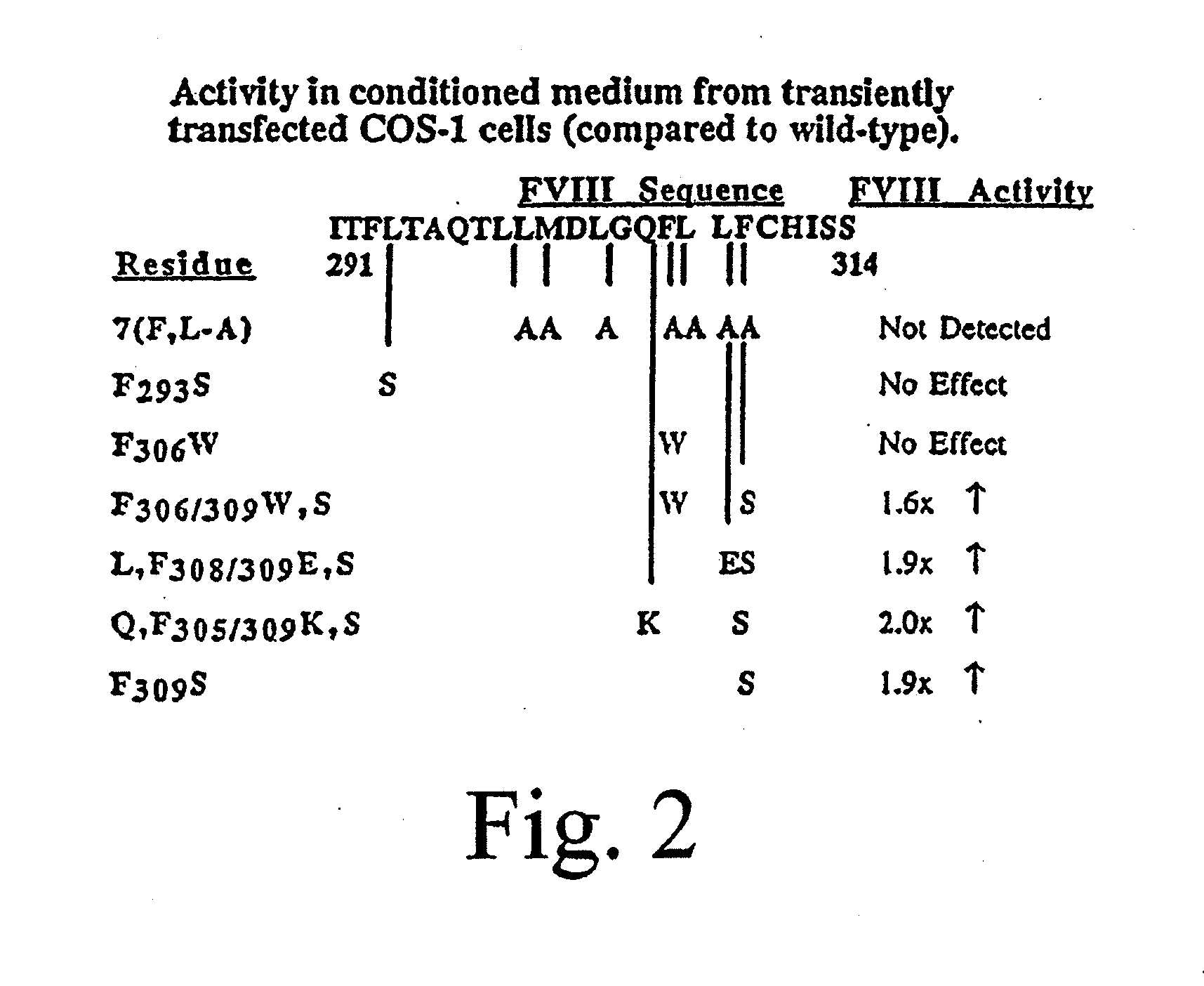Method of producing factor viii proteins by recombinant methods
a technology of recombinant factor and protein, which is applied in the direction of peptide/protein ingredients, unknown materials, fungi, etc., can solve the problems of high cost, prohibitive routine management of bleeding, and limited treatment of bleeding disorders, and achieve the effect of facilitating secretion or expression
- Summary
- Abstract
- Description
- Claims
- Application Information
AI Technical Summary
Benefits of technology
Problems solved by technology
Method used
Image
Examples
example 1
Preparation and Analysis of A1-Domain Mutated Factor VIII
[0141]A statistical algorithm (Blond-Elguindi, S. et al., Cell 75:717-728 (1993)) was applied to predict the BiP binding potential of 7-mer peptides to the 226-336 region of FVIII (residue 1 is the first amino acid residue of the native, mature FVIII protein). Residues Leu303 to Phe309 were found to have a BiP binding score of +14 where any score over +10 has an extremely high probability of binding BiP. Fay, P. J. et al., J. Biol. Chem. 266:8957-8962 (1991). This region contains a hydrophobic cluster where 7 of 11 amino acid residues are Leu or Phe.
[0142]Initially all 7 Leu and Phe residues in the potential BiP binding pocket were mutated to Ala. Site-directed mutagenesis by oligonucleotide overlap-extension polymerase chain reaction (PCR) mutagenesis was utilized. A FVIII / FV chimeric was produced wherein residues 226-336 of FVIII were replaced with the homologous residues from FV (residues 198-313). Marquette, K. A. et al., ...
example 2
Preparation and Analysis of APC Resistant Factor VIII
Experimental Procedures
[0145]Materials. FVIII deficient plasma and normal pooled human plasma were obtained from George King Biomedical, Inc. (Overland Park, Kans.). Monoclonal antibody to the heavy chain of FVIII (F8) coupled to CL4B-sepharose was used and may be prepared by known methods. Activated partial thromboplastin (Automated APTT reagent) was purchased from General Diagnostics Organon Teknika Corporation (Durham, N.C.). Soybean trypsin inhibitor, phenylmethylsulfonylfluoride (PMSF) and aprotinin were purchased from Boehringer, Mannheim GmbH (Mannheim, Germany). Human á-thrombin was obtained from Sigma Chemical Co. (St. Louis, Mo.). Human APC was purchased from Enzyme Research Laboratories, Inc. (South Bend, Ind.). Dulbecco's modified eagle medium (DMEM), á-modification of Eagle's Medium (á-MEM) and methionine-free DMEM were obtained from Gibco BRL (Gaithersburg, Md.). Fetal bovine serum was purchased from PAA Laboratories...
example 3
Preparation and Analysis of Inactivation Resistant Factor VIII
Experimental Procedures
[0160]Materials. Anti-heavy chain factor VIII monoclonal antibody (F-8), F-8 conjugated to CL-4B Sepharose and purified recombinant factor VIII protein were obtained from Genetics Institute Inc. (Cambridge, Mass.). Anti-human vWF horseradish peroxidase (HRP)-conjugated rabbit antibody was obtained from Dako Corp. (Carpinteria, Calif.). Anti-light chain factor VIII monoclonal antibodies, ESH-4 and ESH-8, were obtained from American Diagnostica, Inc. (Greenwich, Conn.). Factor VIII-deficient and normal pooled human plasma were obtained from George King Biomedical, Inc. (Overland Park, Kans.). Activated partial thromboplastin (Automated APTT reagent) and CaCl2 were obtained from General Diagnostics Organon Teknika Corporation (Durham, N.C.). Human thrombin, soybean trypsin inhibitor, phenylmethylsulfonylfluoride and aprotinin were obtained from Boehringer, Mannheim GmbH (Mannheim, Germany). O-phenylend...
PUM
| Property | Measurement | Unit |
|---|---|---|
| molecular mass | aaaaa | aaaaa |
| molecular mass | aaaaa | aaaaa |
| molecular mass | aaaaa | aaaaa |
Abstract
Description
Claims
Application Information
 Login to View More
Login to View More - R&D
- Intellectual Property
- Life Sciences
- Materials
- Tech Scout
- Unparalleled Data Quality
- Higher Quality Content
- 60% Fewer Hallucinations
Browse by: Latest US Patents, China's latest patents, Technical Efficacy Thesaurus, Application Domain, Technology Topic, Popular Technical Reports.
© 2025 PatSnap. All rights reserved.Legal|Privacy policy|Modern Slavery Act Transparency Statement|Sitemap|About US| Contact US: help@patsnap.com



